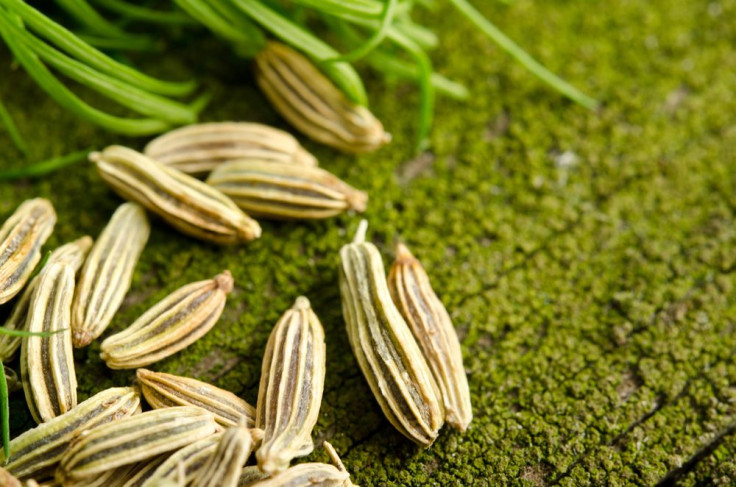What Is Fennel Good For? 6 Conditions It Can Help Relieve

The aroma of this crunchy, licorice-like herb can be found emanating from a cup of tea or even your stovetop. Fennel is a spice used for both culinary and medicinal purposes, which makes it a household staple. Not to mention, it contains vitamin C, potassium, and fiber, among other nutrients, but what does it do for your health?
Fennel is generally safe to consume due to its long history as a spice. While it's not recommended for pregnant women, typical daily doses of fennel are 5 to 7 grams of the seed or 0.1 to 0.6 milliliters of the oil. Similar to most plant-based foods, its benefits can be enjoyed by adding it to dozens of foods, such as sprinkling it on breads or cakes before baking, add-ons in fruit salads, sautéed vegetables, or chewing fennel seeds after meals.
The crunchy superfood has been used in alternative medicine as an effective aid in treating a variety of ailments. Mary Czarnecki, a wellness advocate with doTERRA, told Medical Daily in an email the benefits of fennel date back to ancient times when “Roman warriors were said to have consumed fennel to make them strong and ready for battle. Fennel is best known for its distinct licorice aroma and taste, yet its ability to ease digestive troubles and monthly menstrual cycles are equally noteworthy.”
Learn how fennel can be beneficial not just in the kitchen but nutritionally as well by providing natural relief of these health conditions:
1. Protects Against Aging
Fennel is a natural aid for skin care. Fennel seeds, stalks, bulbs, and leaves are all packed with nutrition and are an excellent source of B vitamins. These vitamins, including vitamin C, are essential for maintaining good skin health and even promote collagen synthesis to keep the skin firm and tight. Cindy Jones, CEO of Colorado Aromatics, uses fennel extract in her Springtide Anti-aging face cream, part of her natural skin care line. “Fennel extracts have long been known to be great for the skin and are used as an anti-aging ingredient,” she told Medical Daily in an email.
A 2012 study published in the journal Die Pharmazie found a cream containing fennel extract contained anti-aging effects on the skin. It improved skin texture and skin moisture. Fennel extracts are valuable as an anti-aging ingredient in many other skin care products.
2. Protects Against Cancers
Fennel contains several nutrients that play a vital role in protecting you from cancer. The herb contains an anti-inflammatory phytonutrient called anethole, which occurs naturally in fennel, known to have anti-cancer effects by stopping breast cancer cells from growing. A 2012 study published in the journal Nutrition and Cancer found anethole has been shown to reduce NF-kappa B — a gene-altering and inflammation-triggering molecule — along with tumor necrosis factor (TNF) — a cancer-signaling molecule.
Moreover, diets rich in fiber, says Vandana Sheth, RDN, CDE, registered dietitian, nutritionist, and spokesperson for the Academy of Nutrition and Dietetics, have been associated with a decreased risk of colorectal cancer.
“Since one fennel bulb provides about 7 grams of fiber, this is another reason why fennel is considered to be good for cancer prevention,” she told Medical Daily in an email.
3. Soothes Colicky Babies
Colicky babies are characterized by crying constantly and hard at about the same time each day for at least three days a week. Although nothing can be done to help them feel better, breastfeeding mothers can sip on fennel tea to calm the digestive tract and help relieve gas and symptoms of colic.
“Fennel may act as a carminative, which is a substance that prevents the formation of gas in the gastrointestinal tract, helping colic in babies,” Beth Warren, a registered dietician and nutritionist in Brooklyn, N.Y., told Medical Daily in an email.
A 2003 study published in the journal Alternative Therapies in Health and Medicine found the use of fennel oil emulsion eliminated colic in 65 percent of the infants in the treatment group compared to the 24 percent of infants in the control group. This provides proof fennel seed oil can reduce intestinal spasms and increase motility of the small intestine. It alleviates gastric pain and discomfort associated with indigestion, abdominal bloating, nausea, belching, and flatulence.
4. Relieves Menstrual Cramps
Stress and a poor diet can affect a woman’s regular menstrual cycle. Women often report menstrual cramps and in some cases dysmenorrhea, which is known as painful menstruation. Fennel can help relax the muscles in the body and contains nutrients that are anti-inflammatory, antioxidants, and antispasmodic, which can help reduce and alleviate these symptoms.
A 2012 study published in the journal Ayurveda found a capsule of 30-milligram fennel extract alleviated menstrual pain when administered four times a day for three days at the start of their menstrual period. It’s important to remember because fennel is antispasmodic, it not only causes muscular relaxation, it can also significantly increase the risk of menstrual bleeding. Those with a history of excessive bleeding are advised to be cautious and consult with their doctor first.
5. Reduces Obesity
The consumption of fennel helps suppress appetite by creating a feeling of satiety. Fennel is a good source of dietary fiber. It boosts your metabolism while breaking down fats and reducing water retention, which are known to be the common cause of temporary weight gain.
A 2006 study published in the Journal of Animal Physiology and Animal Nutrition found fennel can help regulate overeating. Fennel also helps dissolve fat deposits in the bloodstream and allows it to be used as an energy source. The herb is also known as a natural diuretic that aids in the formation and secretion of urine, reducing water retention.
6. Prevents Osteoporosis
The fennel bulb contains several nutrients, including, iron, phosphorous, calcium, magnesium, manganese, zinc, and vitamin K, which contribute to building and maintaining strong bones. A 2012 study published in the International Journal of Molecular Medicine found eating fennel seeds had a beneficial effect on loss of bone mineral density and bone mineral content in post-menopausal bone loss and osteoporosis. The fennel worked by reducing osteoclast — cells that break down weakened bone — differentiation and function. This offers a protective effect on the bones.
The next time you pick up fennel from your grocery store, remember its use goes beyond the culinary realm and can provide an array of medicinal benefits that promote overall well-being.



























